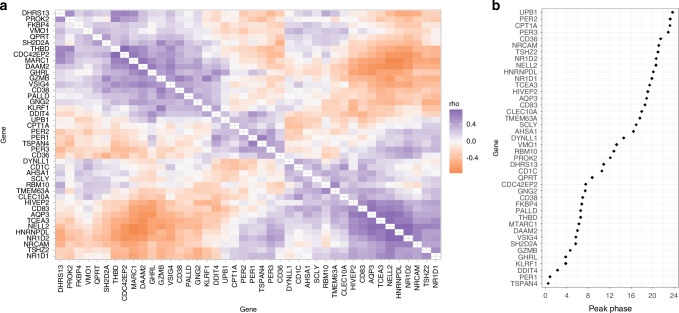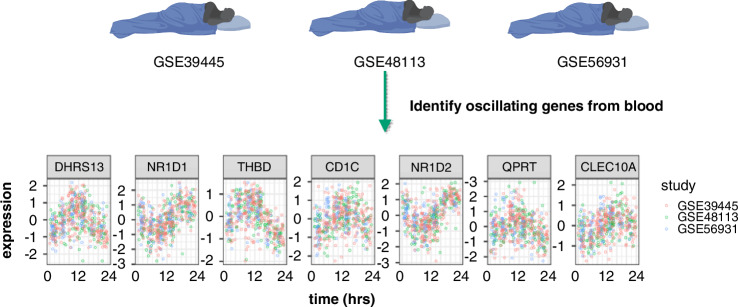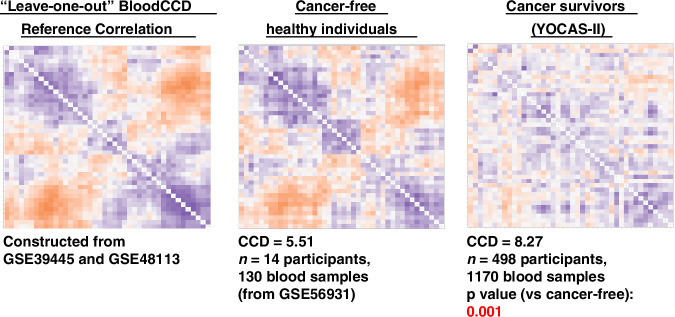Brian J Altman, Po-Ju Lin, Lindsey J Mattick, Elliot H Outland, Javier Bautista, Chin-Shang Li, Umang Gada, Kristina M Morris, Amelia M Knudsen-Clark, Daniel Mwangi, Rachel E DeRollo, Amber S Kleckner, Ian R Kleckner, Nikesha J Gilmore, Benjamin T Esparaz, Amarinthia Curtis, Alison Conlin, Gianni Monaco, Jacob J Hughey, Karen M Mustian
下载PDF
{"title":"血钟相关距离(Blood Clock Correlation Distance, Blood ccd)作为一种检测癌症幸存者失眠患者昼夜节律紊乱的新标志物。","authors":"Brian J Altman, Po-Ju Lin, Lindsey J Mattick, Elliot H Outland, Javier Bautista, Chin-Shang Li, Umang Gada, Kristina M Morris, Amelia M Knudsen-Clark, Daniel Mwangi, Rachel E DeRollo, Amber S Kleckner, Ian R Kleckner, Nikesha J Gilmore, Benjamin T Esparaz, Amarinthia Curtis, Alison Conlin, Gianni Monaco, Jacob J Hughey, Karen M Mustian","doi":"10.1038/s44276-025-00176-9","DOIUrl":null,"url":null,"abstract":"<p><strong>Background: </strong>Insomnia is a toxicity of cancer and treatment for survivors without an objective biochemical measure. Circadian rhythms are 24-h cycles that influence physiologic processes including sleep, and disrupted rhythms may contribute to insomnia. Here, we use BloodCCD to assess circadian rhythms from RNA-sequencing of blood from cancer survivors with insomnia from the YOCAS-II trial. YOCAS-II aimed to determine whether YOCAS©® yoga or cognitive behavioral therapy for insomnia (CBT-I) improved insomnia in survivors compared with a behavioral placebo. We hypothesized that circadian rhythms are disrupted in survivors, and that insomnia severity correlates with the degree of circadian disruption.</p><p><strong>Methods: </strong>BloodCCD was developed to biochemically assess circadian rhythms in blood. It was adapted from the previously published Clock Correlation Distance (CCD) and uses a correlation matrix of 42 genes known to oscillate throughout the day in blood.</p><p><strong>Results: </strong>Cancer survivors had higher (worse) BloodCCD scores, indicating disrupted circadian clock, compared to healthy individuals. Furthermore, insomnia severity correlated with worse BloodCCD, and those in the YOCAS and behavioral placebo arm showed significant correlation between BloodCCD score and insomnia.</p><p><strong>Conclusions: </strong>BloodCCD shows promise as a biomarker to biochemically detect disrupted circadian rhythms in cancer survivors, and as an indicator for insomnia severity.</p><p><strong>Clinical trial identifier: </strong>NCT02613364.</p>","PeriodicalId":519964,"journal":{"name":"BJC reports","volume":"3 1","pages":"60"},"PeriodicalIF":0.0000,"publicationDate":"2025-09-03","publicationTypes":"Journal Article","fieldsOfStudy":null,"isOpenAccess":false,"openAccessPdf":"https://www.ncbi.nlm.nih.gov/pmc/articles/PMC12408818/pdf/","citationCount":"0","resultStr":"{\"title\":\"Blood Clock Correlation Distance (BloodCCD) as a novel marker to detect circadian rhythm disruption in cancer survivors with insomnia.\",\"authors\":\"Brian J Altman, Po-Ju Lin, Lindsey J Mattick, Elliot H Outland, Javier Bautista, Chin-Shang Li, Umang Gada, Kristina M Morris, Amelia M Knudsen-Clark, Daniel Mwangi, Rachel E DeRollo, Amber S Kleckner, Ian R Kleckner, Nikesha J Gilmore, Benjamin T Esparaz, Amarinthia Curtis, Alison Conlin, Gianni Monaco, Jacob J Hughey, Karen M Mustian\",\"doi\":\"10.1038/s44276-025-00176-9\",\"DOIUrl\":null,\"url\":null,\"abstract\":\"<p><strong>Background: </strong>Insomnia is a toxicity of cancer and treatment for survivors without an objective biochemical measure. Circadian rhythms are 24-h cycles that influence physiologic processes including sleep, and disrupted rhythms may contribute to insomnia. Here, we use BloodCCD to assess circadian rhythms from RNA-sequencing of blood from cancer survivors with insomnia from the YOCAS-II trial. YOCAS-II aimed to determine whether YOCAS©® yoga or cognitive behavioral therapy for insomnia (CBT-I) improved insomnia in survivors compared with a behavioral placebo. We hypothesized that circadian rhythms are disrupted in survivors, and that insomnia severity correlates with the degree of circadian disruption.</p><p><strong>Methods: </strong>BloodCCD was developed to biochemically assess circadian rhythms in blood. It was adapted from the previously published Clock Correlation Distance (CCD) and uses a correlation matrix of 42 genes known to oscillate throughout the day in blood.</p><p><strong>Results: </strong>Cancer survivors had higher (worse) BloodCCD scores, indicating disrupted circadian clock, compared to healthy individuals. Furthermore, insomnia severity correlated with worse BloodCCD, and those in the YOCAS and behavioral placebo arm showed significant correlation between BloodCCD score and insomnia.</p><p><strong>Conclusions: </strong>BloodCCD shows promise as a biomarker to biochemically detect disrupted circadian rhythms in cancer survivors, and as an indicator for insomnia severity.</p><p><strong>Clinical trial identifier: </strong>NCT02613364.</p>\",\"PeriodicalId\":519964,\"journal\":{\"name\":\"BJC reports\",\"volume\":\"3 1\",\"pages\":\"60\"},\"PeriodicalIF\":0.0000,\"publicationDate\":\"2025-09-03\",\"publicationTypes\":\"Journal Article\",\"fieldsOfStudy\":null,\"isOpenAccess\":false,\"openAccessPdf\":\"https://www.ncbi.nlm.nih.gov/pmc/articles/PMC12408818/pdf/\",\"citationCount\":\"0\",\"resultStr\":null,\"platform\":\"Semanticscholar\",\"paperid\":null,\"PeriodicalName\":\"BJC reports\",\"FirstCategoryId\":\"1085\",\"ListUrlMain\":\"https://doi.org/10.1038/s44276-025-00176-9\",\"RegionNum\":0,\"RegionCategory\":null,\"ArticlePicture\":[],\"TitleCN\":null,\"AbstractTextCN\":null,\"PMCID\":null,\"EPubDate\":\"\",\"PubModel\":\"\",\"JCR\":\"\",\"JCRName\":\"\",\"Score\":null,\"Total\":0}","platform":"Semanticscholar","paperid":null,"PeriodicalName":"BJC reports","FirstCategoryId":"1085","ListUrlMain":"https://doi.org/10.1038/s44276-025-00176-9","RegionNum":0,"RegionCategory":null,"ArticlePicture":[],"TitleCN":null,"AbstractTextCN":null,"PMCID":null,"EPubDate":"","PubModel":"","JCR":"","JCRName":"","Score":null,"Total":0}
引用次数: 0
引用
批量引用




 求助内容:
求助内容: 应助结果提醒方式:
应助结果提醒方式:


